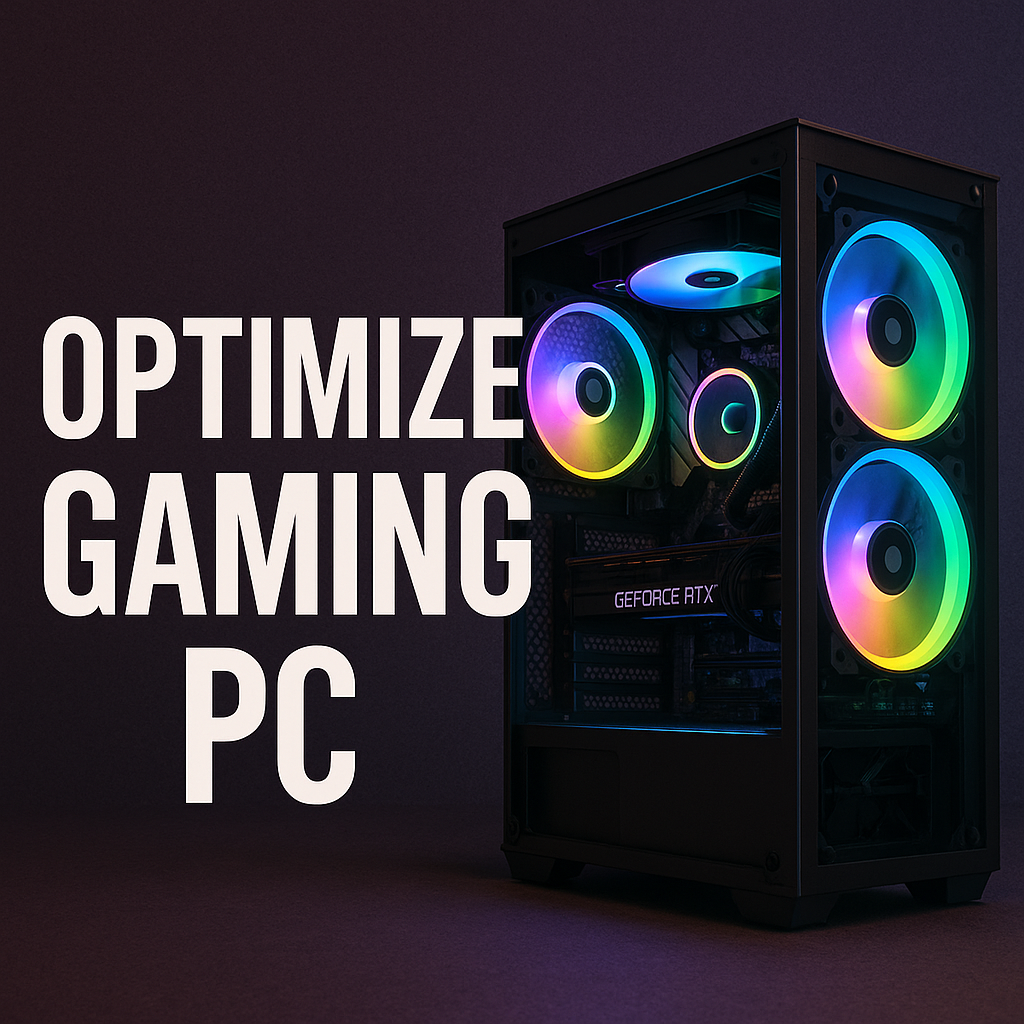- 1. Keep Your Drivers Up to Date
- 2. Enable Game Mode in Windows
- 3. Disable Unnecessary Background Apps
- 4. Lower In-Game Settings Strategically
- 5. Optimize Your Storage Drive
- 6. Upgrade RAM if Needed
- 7. Clean Your PC—Literally
- 8. Overclock (If You Know What You’re Doing)
- 9. Use a Game Booster
- 10. Keep Your Operating System Lean
- Bonus: Download Games from Trusted Sources
- Final Thoughts
Every gamer wants buttery-smooth gameplay, lightning-fast load times, and zero stuttering during intense matches. Whether you’re playing Cyberpunk 2077, Call of Duty: Warzone, or diving into your Steam Summer Sale 2025 backlog, knowing how to optimize your gaming PC for better performance can be the difference between victory and frustration.
This guide breaks down everything you need to know—from quick software tweaks to meaningful hardware upgrades—so your PC can run games at their absolute best.
1. Keep Your Drivers Up to Date
Start with the basics. Graphics card manufacturers like NVIDIA and AMD constantly release driver updates that improve performance and fix bugs.
- Check for GPU driver updates monthly.
- Install chipset and motherboard drivers from your PC manufacturer’s website.
Updated drivers can provide up to 10–20% more FPS in some games with zero cost.
2. Enable Game Mode in Windows
Windows 10 and 11 come with a built-in Game Mode that prioritizes CPU and GPU resources for gaming.
- Go to Settings > Gaming > Game Mode.
- Toggle Game Mode to On.
This can help reduce background processes that steal performance.
3. Disable Unnecessary Background Apps
When you’re gaming, you don’t need apps like Chrome, Discord (unless you’re using voice), or OneDrive running in the background.
- Open Task Manager (Ctrl + Shift + Esc).
- Go to the “Startup” tab and disable apps you don’t need during boot.
- Use “Processes” to manually end high-memory usage apps before launching a game.
Freeing up RAM and CPU helps your game run smoother, especially on mid-range systems.
4. Lower In-Game Settings Strategically
Ultra settings may look beautiful, but they often aren’t worth the performance hit. Lower these settings for a big FPS boost:
- Shadows: High-performance cost, little visual difference.
- Motion Blur: Turn it off. Most gamers find it annoying.
- Anti-aliasing: Lower to FXAA or TAA.
- Ray Tracing: Disable unless you have a high-end RTX card.
You can also use built-in presets like “High” or “Medium” for a good balance between performance and visuals.
5. Optimize Your Storage Drive
Running games on an SSD instead of a traditional HDD can drastically reduce load times and improve performance in open-world games.
Use this checklist:
- Install your most-played games on an SSD.
- Regularly defrag your HDD (do NOT defrag SSDs).
- Keep at least 15–20% of your drive space free for best performance.
If you’re downloading games from external sites, make sure they’re stored on your fastest drive. Trusted places like Epic Games Store or GOG allow you to select your download location.
6. Upgrade RAM if Needed
Modern games often require 16 GB of RAM for optimal performance. If you’re still running 8 GB, it’s time for an upgrade.
- Check RAM usage in Task Manager while gaming.
- Buy dual-channel kits for better bandwidth.
- 3200 MHz or higher is ideal for gaming rigs.
7. Clean Your PC—Literally
Dust buildup can cause overheating, which leads to CPU/GPU throttling. Every few months:
- Power off your PC and unplug it.
- Use compressed air to blow out dust from fans, CPU cooler, and GPU.
- Replace thermal paste if your CPU temps are running hot after years of use.
Lower temperatures = better sustained performance.
8. Overclock (If You Know What You’re Doing)
Overclocking your GPU or CPU can boost performance, but it comes with risks if not done properly.
Tools like MSI Afterburner make GPU overclocking fairly safe and easy. Monitor temps and start with small increments.
Don’t overclock unless you have good airflow and a quality PSU.
9. Use a Game Booster
Game booster apps like Razer Cortex automatically shut down background processes, free up RAM, and improve load times.
While they won’t work miracles, they’re handy for squeezing out extra frames on lower-end PCs.
10. Keep Your Operating System Lean
Every piece of software running in the background is one more thing competing with your game for resources.
- Uninstall bloatware and unused apps.
- Use tools like CCleaner to clean junk files and registry errors.
- Turn off Windows animations and visual effects (System > Performance Settings).
Bonus: Download Games from Trusted Sources
Downloading from shady websites can expose your PC to malware, bloatware, and even miners. Stick to trusted platforms:
These platforms often run massive sales—check out the Steam Summer Sale 2025 guide if you’re hunting for top game deals.
Final Thoughts
To optimize your gaming PC for better performance, you don’t always need to spend big on new hardware. Smart settings adjustments, regular maintenance, and downloading games from trusted sources can significantly boost how your PC handles even the most demanding games.
Make it a habit to review your setup every few months. That way, your system stays snappy, and you’ll be ready to fully enjoy every new title—without performance issues dragging you down.

